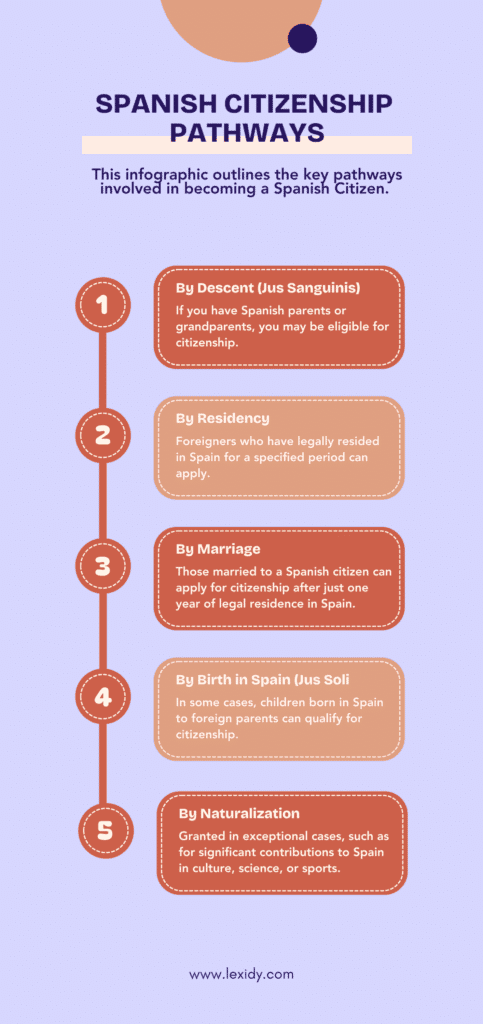Spain is a popular choice for many looking to make it their permanent home. But how exactly can you become a Spanish citizen? There are several ways to get Spanish citizenship, including through residency, ancestry, or marriage. Each path involves meeting certain legal requirements and understanding Spanish nationality laws.
In this blog, Lexidy’s immigration experts will guide you through the different ways to achieve Spanish citizenship. We’ll discuss the process of becoming a citizen, the rules about having dual nationality, and common application pitfalls to avoid.
Whether you’re already living in Spain or thinking about moving there, this guide will help you find the best way to obtain Spanish nationality.
(Article Updated in March 2025)
Table of Contents
- Why Obtain Spanish Citizenship?
- What Are the Main Pathways to Spanish Citizenship?
- What are the Key Requirements to Get Spanish Nationality?
- Does Spain Allow Dual Citizenship?
- How to Avoid Having Your Spanish Citizenship Application Rejected
- How Can Lexidy Help with Spanish Citizenship?
- Ready to Apply For Spanish Citizenship?
Why Obtain Spanish Citizenship?
Getting Spanish citizenship comes with many benefits that go beyond Spain, giving you access to opportunities all over the European Union. Here are some key reasons why getting Spanish citizenship is a great advantage:
- Freedom of Movement: Enjoy the right to live, work, and travel freely anywhere within the EU. This mobility opens up a broader job market and living options.
- Global Mobility: A Spanish passport is one of the most powerful in the world, offering visa-free or visa-on-arrival access to 192 countries.
- Access to Services: Full residence rights in Spain mean access to high-quality healthcare, educational opportunities, and comprehensive social benefits.
- Voting Rights: Participate in both local and European elections, giving you a voice in shaping the policies of your community and the broader EU.
What Are the Main Pathways to Spanish Citizenship?

There are several ways to obtain Spanish citizenship, each with its own set of requirements and timelines. Here are the main methods for becoming a Spanish citizen:
- By Descent (Jus Sanguinis): If you have Spanish parents or grandparents, you may be eligible for citizenship either through option (only when parents are Spanish) or by residency.
- By Residency: Foreigners who have legally resided in Spain for a specified period can apply, typically after 10 years (shorter for certain nationalities and circumstances).
- By Marriage: Those married to a Spanish citizen can apply for citizenship after just one year of legal residence in Spain.
- By Birth in Spain (Jus Soli): In some cases, children born in Spain to foreign parents can qualify for citizenship, when parents are stateless or from countries that do not grant nationality by descent.
- By Naturalization: Granted in exceptional cases, such as for significant contributions to Spain in culture, science, or sports.
What are the Key Requirements to Get Spanish Nationality?

Each pathway to Spanish citizenship has specific requirements you must meet to qualify. Let’s explore the details of each option and what you need to do to become a Spanish citizen.
Spanish Citizenship by Descent (Jus Sanguinis)
In Spain, you can claim citizenship via Spanish ancestry in certain circumstances:
- If one or both of your parents are Spanish nationals, you automatically qualify from birth.
- If you were born outside of Spain but have a Spanish grandparent, you may also be eligible, depending on certain conditions.
- Spain has also introduced the Democratic Memory Law (Ley de Memoria Democrática), allowing children and grandchildren of original Spanish citizens to request their right for Spanish citizenship. However, this path will end by October 20th. 2025.
Applicants must provide documentation proving their Spanish lineage, such as birth certificates, family records, and proof of Spanish nationality from ancestors.
Spanish Citizenship by Residency
Foreigners who have legally resided in Spain for a specific period can apply for citizenship. Typically, you will require at least 10 years of legal residence to qualify, but there are exceptions:
- 5 years for recognized refugees
- 2 years for nationals of Latin American countries, Andorra, the Philippines, Equatorial Guinea, Portugal, or Sephardic Jewish descendants
- 1 year for those born in Spain, married to a Spanish citizen, widows/widowers of Spanish citizens, or children/grandchildren of Spanish nationals
Applicants must demonstrate integration into Spanish society, pass the CCSE (constitutional and cultural knowledge test), and for non-native Spanish speakers, the DELE A2 Spanish language exam.
Spanish Citizenship by Marriage
If you are married to a Spanish citizen, you can apply for Spanish nationality after just one year of legal residence in Spain. Key requirements include:
- A legally recognized marriage to a Spanish citizen
- Proof of cohabitation in Spain
- No criminal record
- Passing the CCSE and DELE A2 (if applicable)
Unlike some countries, Spain does not automatically grant citizenship upon marriage— you are required to prove residency and complete your application.
Spanish Citizenship for Sephardic Jews
In 2015, Spain introduced a law that acknowledges the historical ties and wrongful expulsion of Sephardic Jews in the 15th century by allowing them to obtain Spanish citizenship. This legislative move provides a means for Sephardic Jews to reclaim their heritage by demonstrating their ancestry and a “special connection” to Spain. Unlike other applicants who typically need ten years of legal residency to qualify for citizenship, Sephardic Jews are eligible to apply after just two years of legal residency.
In addition to proving Sephardic origin and a connection to Spain, applicants must meet the following requirements:
- Pass the A2 Spanish language proficiency test (DELE).
- Pass the cultural knowledge exam known as the CCSE.
- No criminal record.
Spanish Citizenship by Naturalization
In exceptional cases, the Spanish government grants citizenship by naturalization (Carta de Naturaleza) to individuals who have made significant contributions to Spain. This process is discretionary and has been awarded to notable athletes, scientists, artists, and other distinguished figures.
Naturalization applications do not follow a strict residency timeline, but approval is rare and requires strong justification.
Each of these pathways has specific eligibility criteria, and understanding which one applies to your situation is crucial — visit our Spanish Citizenship service page for more detailed eligibility information and answers to common questions.
Does Spain Allow Dual Citizenship?
Spain generally has strict rules about dual citizenship, which usually require foreigners who become Spanish citizens to give up their original nationality. However, there are some exceptions where Spain permits dual citizenship.
Let’s go over the basics of dual citizenship in Spain. For a more comprehensive explanation, check out our article on Dual Citizenship in Spain to learn all the details.
Who Can Keep Dual Citizenship?
Spain permits dual citizenship for nationals of specific countries and groups, including:
- Latin American countries (Argentina, Mexico, Colombia, etc.)
- Andorra, the Philippines, Equatorial Guinea, and Portugal
- Sephardic Jewish descendants (for those who obtained citizenship under the now-closed special law)
Citizens of these countries are not required to renounce their original nationality when becoming Spanish.
Who Must Renounce Their Original Citizenship?
If you are from a country outside the above list, such as the UK, USA, Canada, Australia, or most of Europe, it is likely you will be required to formally renounce your original nationality when obtaining Spanish citizenship. However, this is often a symbolic renunciation, as some countries do not recognize the loss of nationality unless the applicant actively revokes it with their home country’s government.
Spanish Citizens Acquiring Another Nationality
Spanish nationals who voluntarily acquire another nationality may lose their Spanish citizenship unless they:
- Belong to one of the countries that allow dual nationality with Spain.
- Declare their intention to retain Spanish nationality within three years of acquiring the new citizenship in front of the competent Spanish Consulate.
Does Spain Allow Hidden Dual Citizenship?
Many people from non-Latin American countries keep their original passport even after acquiring Spanish nationality, as Spain does not actively monitor renunciations. However, this can cause legal issues if discovered, especially when renewing Spanish documents.
Since Spain’s dual nationality rules can be complex, it’s always advisable to consult with an immigration expert before applying for Spanish citizenship. Contact us by filling in the form below for a free consultation.
How to Avoid Having Your Spanish Citizenship Application Rejected

Applying for Spanish citizenship can be a complex process. It is not uncommon for applicants to face delays or rejections due to common mistakes. Here are some of the most frequent pitfalls and how to avoid them:
1. Failing to Meet Residency Requirements
Many applicants miscalculate their required residency period or fail to meet the criteria for continuous residence.
To avoid this, ensure you have legally resided in Spain for the necessary period (typically 10 years for most applicants). Avoid prolonged absences, as they could reset your residency clock.
2. Incomplete or Incorrect Documentation
Missing or incorrectly prepared documents are a major reason for application rejections.
It is essential that you carefully review all required documents. This includes your TIE (residence card), padrón certificate (proof of address), criminal record certificates. Ensure all documents are correctly legalized and translated.
3. Failing the CCSE and/or DELE Exam (If Required)
Some applicants do not prepare adequately for the required exams. You may be required to take the following exams:
- The CCSE exam tests knowledge of Spanish culture, society, and government.
- The DELE A2 exam (for non-Spanish speakers) assesses basic Spanish language skills.
Be sure to start preparing in advance. There are online resources and practice tests available for both exams. If you’re unsure about your Spanish proficiency, consider taking language classes.
4. Criminal or Police Record Issues
A criminal record, even for minor offenses, can result in a rejected application.
To mitigate this, you must obtain police clearance certificates from both Spain and your home country. If you have any past offenses, seek legal advice on whether they will impact your application.
5. Delays in Processing & Lack of Follow-Up
Spanish bureaucracy can be slow, and some applications get delayed or lost in the system.
There is not much you can do to speed up the process, but you can track its progress on the Spanish Ministry of Justice website. If processing takes longer than a year, you may be able to take legal action to expedite your case.
Applying for Spanish citizenship is a detailed process, and even small errors can cause major setbacks.
How Can Lexidy Help with Spanish Citizenship?

Navigating the Spanish citizenship process can be a bit of a headache. The strict requirements, legal paperwork, and potential bureaucratic delays make it a complex process. At Lexidy, our expert immigration lawyers specialize in guiding expats through every step of the process, ensuring a smooth and stress-free experience.
Here’s how we can assist you:
- Personalized Consultation – We assess your eligibility and recommend the best pathway to Spanish citizenship based on your circumstances.
- Document Preparation & Verification – We inform you on the necessary documents to be gathered, which ones needs legalization and we can assist with the translations.
- Residency & Citizenship Applications – Whether applying through descent, residency, marriage, or naturalization, we are here to guide you until the very end.
With Lexidy’s immigration specialists by your side, you can ensure a smooth and successful journey toward obtaining Spanish nationality.
Ready to Apply For Spanish Citizenship?
Obtaining Spanish citizenship opens the door to incredible benefits, from unrestricted EU travel to long-term residency and employment rights in Spain. Whether you qualify through descent, residency, marriage, or naturalization, understanding the requirements and preparing your application correctly is essential for success.
At Lexidy, our expert immigration lawyers are here to simplify the process, helping you navigate Spain’s citizenship laws with confidence. From eligibility assessments to document preparation and legal support, we ensure that your journey to Spanish nationality is as smooth as possible.
Whether you’re ready to move forward or just exploring your options, you’ll find everything you need on our Spanish Citizenship service page — or simply fill out the form below to speak with our team.!

